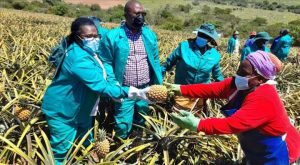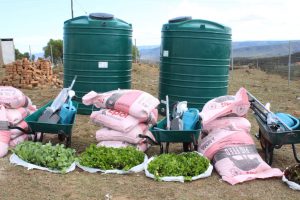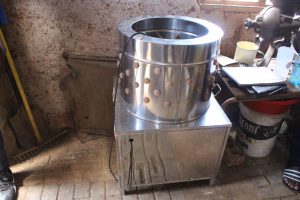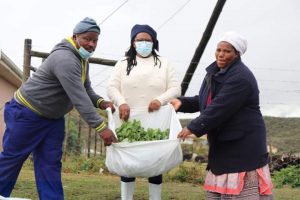
by Olwetu Batyi | Oct 21, 2021 | Uncategorized

Massive drive to create jobs
By Thozi kaManyisana
The government of the Eastern Cape is on a massive job creation drive by ensuring that agricultural projects are supported to become economically viable through creating a conducive environment for businesses to thrive.
This was said by Premier Oscar Mabuyane who joined the Rural Development and Agrarian Reform (DRDAR) MEC Nonkqubela Pieters during a pineapple harvest at Tarfield farm in Ngqushwa where she also handed over two tractors to pineapple farmers.
“We want to have a massive job creation , ensure that we are not creating seasonal jobs but fulltime jobs through value addition. The government is creating a conducive environment for economic growth hence we are making opportunities available for businesses to invest. This pineapple production programme is doing exactly that,’’ said Mabuyane.
DRDAR has invested about R2,2 million since the 2019/20 financial year for fencing, production inputs, a tractor and fuel. The invested made by the department translated to 69 temporary jobs, while a further 10 are employed on a permanent basis.
He said DRDAR has facilitated a market for the farmers as the harvest from these farms is sold to Summerpride Foods through an off-take agreement that ensures that the farmers have an established market.
In their first harvest the farm recorded a yield of 1 500 tons while in 2020 they harvested 2300 tons. In this year’s harvest, they are hoping for a yield of 3 000 tons.
“This is rural development at its best and I am excited to see the progress we are making in reviving programmes that were successful during the previous government.
“We need to attract investors to projects such as these. I am happy about the commitment and dedication shown by the pineapple farmers hence we need to multiply investment to these projects .
He said government has invested about R20m to at least six pineapple farms in Peddie where 182 hectares of land is currently under production and “working together with our partners, we will increase hectorage in pursuit of economic growth.”
“The baseline of total land under production for Pineapple in the province is 7 800 ha. Through the implementation of the Agriculture for Growth and Employment Programme, we will increase the land under production to 10 300 ha. This will lead to an increase in the baseline for jobs in pineapple production from 8 000 to 10609 and to an economic growth baseline of R1,45 billion,” Premier Mabuyane.
Founding member and supervisor at Tarfield farm Mlungiseleli Bala said they were “reaping good fruits” from the investment in the pineapple industry compared to when they use to plough maize.
“The pineapple is drought-resistant and we are now harvesting good yields despite the dry conditions. This development has changed people’s lives through job creation and ownership of the business,” Bala said.
Bala used to work for a pineapple-producing farm owned by the former Ciskei government’s development agency Ulimocor.
Chairperson of Tarfield Farm Zondiwe Maseti could not contain her joy about the revival of pineapple production in the Ngqushwa area.
“We had nothing when we started. It was out of love but government has elevated us to greater heights. When government says ‘get up, do something for yourself and aid will find you along the way’ is not an ignorant statement. We have seen that through our experience,” she said.
Summerpride fruit manager Pierre Tilnely said they were exporting the pineapple from the Ngqushwa farms to South America, Russia and Europe and they were excited about the investment made by the government in the area as it guarantees sustainability.
He said worldwide there was a massive demand for more pineapple fruit and the fruit from the Ngqushwa farmers was what the market needs.

by Olwetu Batyi | Oct 15, 2021 | Uncategorized
Eastern Cape Rural Development and Agrarian Reform MEC, Nonkqubela Pieters and local farmer, Mr Mveleli Mhlonitshwa, show the maize seed to be planted in many mealie fields and grain producing farms in the Eastern Cape as part of the cropping programme during the official launch in the Upper Tabase Village. During the launch Pieters announced that the department is investing R79. 3 million in maize production covering 26 198 hectares of land in OR Tambo, Alfred Nzo, Amathole, Joe Gqabi and Chris Hani District with R42. 3 million of this money is invested in production inputs for farmers for maize production on 13 633 Ha, R36.8 million invested in mechanisation for farmers for production on 10 021 Ha, R37.6 million allocated for partnership with farmers, AfroSaint Business Consultants, Dalasile AgriPark, Nodayimani Investments and Luleka Mbete Investments, SAGRA, Ukhanyo Farmer Development, Wiphold to produce maize to be sold through off-take agreements.

by Olwetu Batyi | Oct 7, 2021 | Uncategorized

Peddie Youth use R350 Covid-19 Relief grant for a lifetime investment
By Thozi kaManyisana
While most young people at Nobumba Village in Peddie used the Covid-19 Relief grant buying “unnecessary items”, five young people from the village decided to start a poultry project using the R350 grants.
The five cousins sad they decided, “not to waste the money” they received from government but put it in “good use” because four of them had lost jobs due to Covid-19 and “we wanted to put food on top of the table.”
This inspiring story was revealed when the Department of Rural Development and Agrarian Reform (DRDAR) MEC Nonkqubela Pieters visited the project to” officially handover a plucker machine, water tanks, 100 broiler chicks and 4 bags of broiler feed.
“Our vision was to get up and do something for ourselves after losing jobs and we used the R350 grants to start a poultry project so that we can sustain our families. As young people, we saw it fit to be involved in the agriculture sector and poultry was our first choice,” said the Chairperson of Bayeni Poultry Co-op Phumlisa Ngabase (26) who lost her job due Covid-19.

Ngabase who is the only female in the group said in March last year, they made bricks with soil and built a structure to accommodate their chickens.
She said they approached DRDAR to get guidance and assistance on how to initiate and manage a sustainable poultry business.
“DRDAR willingly assisted us by providing training and we are constantly in touch with our extension officer for advice.
“We are very grateful about the assistance we have received from the department because it has minimised our challenges and we are starting to see profits,” she said.
In the 2021/21 financial year, the project received five bags of feed and 50 day-old chicks from DRDAR and for Ngabase that was a “great relief because feed and chicks are expensive .”
“The water tank has assisted us a lot because we use to go to the nearby Woodlands village at R80 per 200 litres and now that we have the tank, the expenses are lower and our profits are multiplying,” she said jubilantly, adding that they were selling their broiler chickens in surrounding villages and in Grahamstown.
During the event, the MEC handed over another 400 chicks and 15 bags of feed, 2400 various vegetable seedlings, 10 wheelbarrows, 20 bags of piggery feed, garden tools and a plucker machine to 17 other youth projects from the Peddie area and was elated about the level of youth commitment in agriculture.
Talking about the Bayeni project, the MEC said; “These youngsters have done a commendable and noble thing because others see these R350 Covid-19 grants as entertainment vouchers . You have changed the R350 monthly grants into a lifetime investment and I will use you as an example whenever I go so that others can follow suit.”
“ As the youth of Peddie you have made me proud because you are not sitting idle but you have realised that there’s life and wealth in agriculture.
You have really grabbed government opportunities with both hands and we are committed to work with you, “she added.

by Olwetu Batyi | Oct 6, 2021 | Uncategorized
Government boosts Ngqatyana woolgrowers
Intergovernmental efforts between the Eastern Cape Department of Rural Development and Agrarian Reform and Mbhashe Local Municipality have catapulted Ngqatyana woolgrowers to a commercial level with a fully-fledged sheep shearing shed.
The R600 000-worth shed was built by the local authority in the 2020/21 fiscal year for 35-member association of Ngqatyana Wool Growers Association who had been shearing their sheep on informal structures.
To professionalise the farmers, DRDAR supported the Ngqatyana woolgrowers with shearing equipment worth R103 000. The equipment includes a wool compressor, baling machine, trolleys, sorter, shears, tables and shearers.
MEC for Rural Development and Agrarian Reform, Nonkqubela Pieters handed over the equipment to the woolgrowers for use on Tuesday [October 5] in Ngqatyana Village.
Pieters said the quantity of wool the farmers produced each season proved that with a touch of professional equipment they can produce world-class wool.
“Nina nenza lento urhulumente ayifunayo –qala ngalonto encinane unayo, uncedo luzakufumana endleleni,” she said.
“We are operating with limited resources therefore working with other spheres of government and other stakeholders is critical. This fiscal year it is your turn to benefit from your government as it was the case to others in the past.
Today we are giving you a steppingstone to add value in your wool –shear, sort, compress and bale at your own convenience.
This equipment will propel you to a commercial level where you will participate meaningfully in the world’s economy because most of our wool is shipped abroad,” added Pieters.
The Eastern Cape is listed among the producers of top class wool in the world.
The shearing equipment complements another initiative by DRDAR where the provincial department aided the Mbhashe Local Municipality woolgrowers with Merino sheep rams under its Livestock Improvement Scheme meant to improve the genetics of livestock of developing farmers.
Merino sheep are known for the quality of their wool and woolgrowers of Ngqatyana were among the beneficiaries of the Livestock Improvement Scheme.
Chairperson of Ngqatyana Woolgrowers Association, Mpumelelo Bhalindaba said this was going to be their first shearing season since they received the rams.
“I can safely say from today onwards, we are professional business people in wool production. The days of shearing on muddy surfaces with substandard equipment that tend to lower the quality of our wool are over now,” said Bhalindaba.
Government is continuously intervening with relevant service delivery to improve the livelihood in Xhora .
“In the past shearing seasons we have made a profit of more than R4 million across the Mbhashe Local Municipality. With the equipment we have received, surely our bottom line as the Ngqatyana Woolgrowers Association will improve,” he said.
Ngqatyana Woolgrowers Association sell their wool to one of the country’s wool specialists –Cape Mohair and Wool (CMW).
Treasurer of the 14 women member association, No-Ayini Sikhundla added that the equipment they received would make the shearing process easier and faster.
DRDAR didn’t only support the woolgrowers with shearing equipment, but the department trained the beneficiaries on professional wool production and continues to render veterinary support to the farmers to help maintain their flock.
The department has also forged partnerships with private industry players in a bid to further develop the communal woolgrowers.

by Olwetu Batyi | Oct 6, 2021 | Uncategorized
Youth’s passion in Agriculture inspires MEC
By Thozi kaManyisana
THERE was much jubilation and ululation at Great Kei Municipality’s Mangqukela Village in Mooiplaas when Rural Development and Agrarian Reform (DRDAR) MEC Nonkqubela Pieters donated 1400 seedlings to a local cooperative.
Chicago Primary co-op owns a 4ha piece of land where they grow potatoes and maize as well as leafy vegetables which they sell at Spar Supermarket and the surrounding community.
“The passion of the youth here is inspiring, I am happy that I was engaged by young people who are working with their parents in the farming industry.
The agricultural sector has been historically dominated by men and some are now elderly hence I applaud the involvement of youth in this project.
It is very essential to work with youngsters in this industry so that they can see the value of the land where the wealth is,” she said.
The MEC was “elated” by the testimony of an unemployed graduate Nomagcina Suduka who told the MEC how the young people were active participants in agriculture from food gardens, ploughing fields to rearing livestock, poultry, as well as woodwork and fashion designing.
“I thought I would surprise you by coming here driving a tractor so that you can see a young woman can also drive a tractor and be able to plough,” said the 28-year-old who is ploughing vegetables on 2ha of land.
She said the MEC’s visit to the village, which has four “united” vegetable producing projects, has “encouraged us as young people.
We want to follow our parent’s foot steps so that when they are gone there can be continuation of growth and development.”
Chairperson of the five-member Chicago Primary Co-op Vuyisile Siko praised the department for its “continuous support, which is changing our lives for the better.
The MEC visit will give us the willpower to grow stronger and produce more.
“Land is the number one natural resource, which is the pillar of development and that is what we teach our children.”
He said they started their project in 2016 and DRDAR has been supporting them through its household food security programme that is aimed at ensuring households are producing food for consumption and generating profit with the surpuls.
The MEC committed herself to come back to area for other rural development initiatives like sewing and furniture making as well as other agriculture projects.












